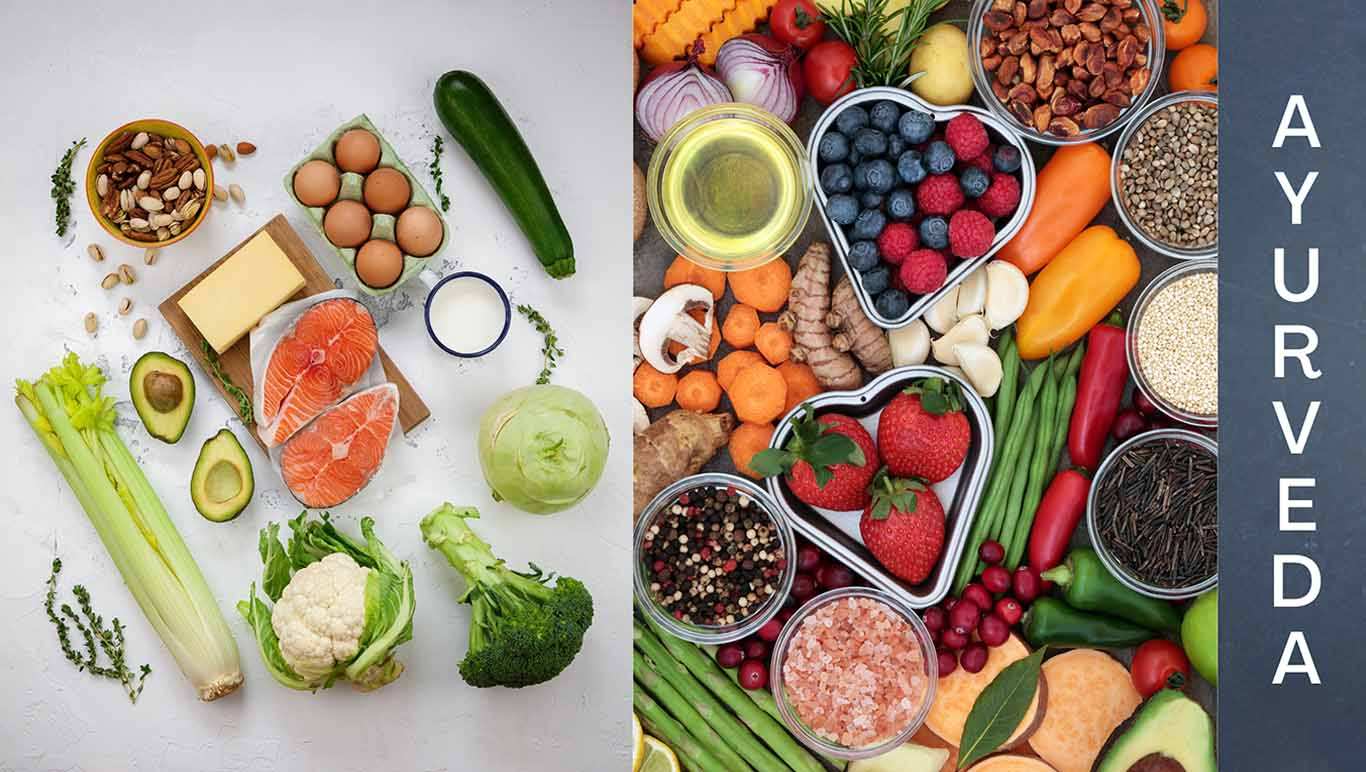Ayurveda Nutrition and Diet Rules

Ayurveda Nutrition and Diet Rules by Yoga Ayurveda Trainer, ‘Pradeep Kumar.’
(Extracts from the Ayurveda Nutrition and Diet Course lectures at Vishuddhi Isha Yoga, Goa India)
Ayurveda can be considered a lifestyle or an effective holistic health Science to maintain our health and well-being. Ayurveda nutrition and diet principles are the most fascinating nutrition concepts which are as relevant today as they were hundreds of years back in time. The prime reason is, we still carry the same genetic code of humans who walked on the planet Earth thousands of years in past and we still have the same cognitive memory which dates to the starting of human existence in the history. Nothing has much changed except our indiscriminate transgressions of natural laws of Universe, living and nature. This has led to inexplicable disorder, miseries and pain for us.
One way to fix is to establish a new relationship with our food as food is consciousness and its part of the same nature which we are the part of. Once we create this subtle awareness and relationship within us then we would manage to strike that balance which we all need eventually to be healthy, happy and harmonious.
Ayurveda provides deeper insights into every aspect of our mind, body and spirit and how to create that union or balance but most vividly, it offers us a comprehensive age-old ancient principle of nutrition, particularly when it comes to the digestion.
The following are some of the basic guidelines (that apply to all doshas) that we must follow to start with:
Eat only when you are hungry and drink only when you are thirsty. It means that you should only eat when your body is really and truly hungry. Ideally, your previous meal should have been completely digested and out of stomach and then your body must feel hunger to bring next meal. There are times when people feel hungry, but they are just dehydrated. Adapt to your body signals and find out and feel, what true hunger is. Also drinking 4 or 5 liters of water everyday is a myth coming from western diet system. We need everything in balance. Health is not generalization. Let your body decide what, when and how much it needs. It has all the intelligence.
Eat the appropriate quantity. Everybody is different based on their metabolic rates, needs, stomach sizes and lifestyle. Listen to what and how much your body needs and only eat until your body gets satisfied and your stomach gets partly filled.
Eat quality food. Ensure that the quality of your food is good. When it comes to quality then it also comes to purity, organic nature and simply cooked without too much of processing or excessive cooking. Also eat balanced and eat everything as per the season and doshas. Your food should also have little bit of oil and water content and should not be too dry, too hot or too cold. Moderation is the key in Ayurveda not extremes. Good quality food in the right quantity only promotes good absorption and digestion.
Eat warm meals but not too hot. It’s ideal to eat meals that are freshly cooked. If you don’t eat anything directly from the refrigerator, you can preserve your Agni (Digestive fire). Eating warm foods enables your digestive enzymes to function properly and efficiently.
Be mindful when you are eating. Rely on all your senses. Appreciate how the food looks, aroma, texture, touch, smells and your plate on the table. Free your mind from all distractions like television, mobile phones or arguments. Be mindful and eat with relaxed joyful mind. Chew it properly and for long before you swallow it down.
Don’t eat conflicting or incompatible food items together. You may be risking a stomach upset or indigestion that would only produce trail of toxins.
Eat at regular intervals. Nature likes regularity as we are part of the nature. Random eating timings and schedule disturbs the natural biological clock and impairs our digestion. So, stick to fixed times when you eat. Nothing is more important than your good health and big part of it comes from your nutrition and good digestion so give a well-deserved priority to your food habits and timings.
Finally, eat as per your needs, hunger, and body constitution. It’s also important to eat local easily available food, cooked with mild spices and condiments as they aid digestion. Special diet needs to be followed if there’s any special health condition that demands special Ayurveda nutrition and diet, but it should be followed only under the guidance and consultation of an experienced and skilled Ayurveda health consultant or doctor.
It is important to emphasis that only eating good is not important but digesting good as well. So, eating as per our body needs, doshas and conditions are extremely important. When properly followed, the Ayurveda nutrition and diet can help you become healthier, starve off various diseases and help you lose weight naturally. One of the most important things you can do to your health is to eat properly and wisely.
Just like medicine, food is considered powerful. There’s even a sloka or saying in Ayurveda that says, “food is a medicine when properly consumed.”, If you eat foods that are specific for your physiology and adhere to a life supporting (Sattvic) routine, which promotes proper digestion, then your body can benefit immensely. In Ayurveda, you metabolize with all yours senses and you don’t only metabolize your food.
Everything you taste, touch, smell, see, or feel becomes a part of you, connecting us to these sensations on emotional, mental, and physical levels. Let’s cultivate a healthier life by adopting wholesome diet and food habits, drawing inspiration from the principles of Ayurveda Nutrition and Diet.

![1[1] Yoga Therapy](https://vishudhiyogaayurveda.com/wp-content/uploads/2024/08/11-300x200.jpg)
